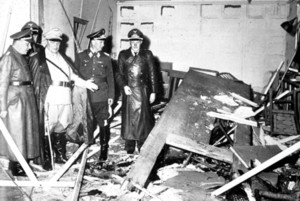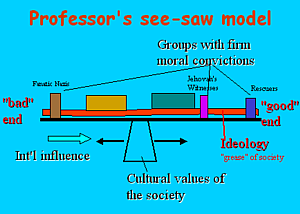UCSB Hist 33D,
Lecture 12:
Ethics
by Prof. Marcuse (Nov. 5, 2002)
Please turn in your journals
- Resistance--summary
- What motivates people to do good (or evil)?
- Theory and examples
- Announcements (winter quarter courses; final exam)
- See-saw model of groups in society
Last Lecture: Resistance
Questions: The who what when where how and why of resistance?
Answers:
- Who: peOple, Elites/Institutions, Int'l, not
economy
- What: range from surviving to amelioration to destruction of system (depends
on situation of resistor)
- When/where:
- dependence on the subjective assessment of the circumstances
by the (potential) resisters; opportunity;
- dependence on the objective situation (relative to powerholders)
of the (potential) resisters
- How: wide variety of means available
- Why: Economic, Ideological motivation
Today's Question
What motivates people to do good (or evil)?
Ethics vs. Morals:
right and wrong
good and bad
Þ
the right thing to do may still be bad
Example 1: Church & Euthanasia
- Sept. 1939 directive signed by Hitler
- Killings began 1940
open secret in area; causes of death (appendicitis)
- 3 August 1941 sermon by Bishop of Munster, v. Galen: widely circulated
"If you establish and apply the principle that you can
kill 'unproductive' fellow human beings then woe betide us all when
we become old and frail! If one of us is allowed to kill the unproductive
people then woe betide the invalids who have used up, sacrificed and lost
their health and strength in the productive process. If one is allowed forcibly
to remove one's unproductive fellow human beings then woe betide loyal
soldiers who return to the homeland seriously disabled, as cripples, as invalids.
If it is once accepted that people have the right to kill 'unproductive'
fellow humans -- and even if it only initially affects the poor defenceless
mentally ill -- then as a matter of principle murder is permitted for all
unproductive people, in other words for the incurably sick, the people
who have become invalids through labour and war, for us all when we become
old, frail and therefore unproductive." [after Burleigh and Wippermann,
Racial State (1991), 152].
- 24 August 1941: Hitler orders program stopped (Had it fulfilled "stage
1" already anyway?)
70,273 persons murdered by gassing;
93,251 beds "released" (of 282,696; 33%)--closer to total number killed
- Continued lower key as "Aktion 14f13"

Example 2: July 20, 1944
- German army leaders were
against Hitler's plans for war
- Invasion of Czechoslovakia,
1939: Hitler too popular
- Waited, waited, waited
- AFTER Allied invasion of France, June 1944
Þ nothing to do w/ Holocaust!
Kant's Categorical Imperative (1790s)
- "act only on that maxim by which you can at the same time will that it should become a universal law." Morality, then, consists of choosing only those actions that conform to the categorical imperative.
- "Act so that the maxim [determining motive of the will] may be capable of becoming a universal law for all rational beings."
- "Act in such a way that you always treat humanity, whether in your own person or in the person of any other, never simply as a means, but always at the same time as an end."
Announcements
- Reader available Wed. afternoon, at GrafikArt in IV
- Journals due today with 6 entries (total)
- My courses next quarter:
- GE 1 EW: "Nazi Holocaust in History, Literature, and Film" (freshman
seminar) (T-Th 11-12:15)(GE 1 EW Website)
- INT 184HM: Oral History & the Holocaust (L&S honors seminar)(F
10-1)
- Spring quarter: Hist 2C:
World History
- Midterm evaluation (.pdf)/ final exam
format (we'll discuss on Thursday)
Professor's see-saw model

back to top

